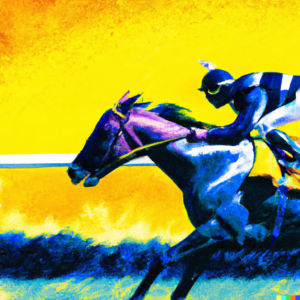
Horse racing is known as one of the oldest sports disciplines in the world, and as such, it has a role in shaping different cultures across the globe. Even though it is still unknown when the first race took place, the oldest evidence of racing dates back to 4000 BC Central Asia, the time right after the domestication of horses. Centuries have passed, and men and horses continued to take part in this thrilling sport which nowadays attracts a large number of passionate bettors.
The History of Horse Racing
Horse racing has been practiced in ancient civilizations across the world, and besides the above-mentioned evidence that connects it with Central Asia, it was also common in Ancient Rome, Ancient Greece, Egypt, Syria, and Babylon. Chariot racing was one of the most popular sports among the Romans, Greeks, and Byzantines. Both mounted and chariot races were important events in the ancient Panhellenic Games, while in the Roman Empire, they were considered major industries. Later on, thoroughbred racing began to rise in British society, becoming as popular as it is today, known as the Sport of Kings. Throughout the centuries, equestrians improved their skills through numerous races. At the same time, they presented the crowds with entertainment, as well as proficient horsemanship required in battle. The races also resulted in the development of specialized equipment and dedicated breeds. And if there wasn’t for the popularity of equestrian sports, certain skills that used to be frequently used in combat would have vanished by now.
Organized Racing
Given the discipline’s immense popularity, it wasn’t surprising that soon enough organized horse racing became an established sport. During his reign which lasted from 1649 to 1685, Charles II organized The King’s Plate races, and those were one of the first-known events where the winners received prizes for their results. On top of that, these events also showcased the first set of rules ever recorded, and it is interesting to note that many of them are still in use today.
King Charles II was also the one who established the prominence of Newmarket – today’s headquarters of British horseracing. By 1750, the Newmarket races started to be controlled by the newly formed Jockey Club. The system of wagering was also established, and all social classes took part in it. Meanwhile, organized racing also evolved in other parts of the planet. For instance, its inception in the United States is considered to have begun in the 1600s, with the occupation of New York City.
Betting on Horse Races
Betting has been associated with horse racing on a global scale for centuries, and for many fans, it is the primary reason why they attend the events. Punters can wager on a series of different outcomes, including the horse that will finish the line first, second, or third. The most popular wagering methods are betting to win, show, and place. Thanks to today’s technological advancements, bettors can now choose between traditional and online wagering, the latter being more popular nowadays.
The Popularity Across Countries
Horse racing is more than just a type of entertainment, and many countries developed a significant portion of their sports tradition around it. That is why we need to mention the countries where horse racing is deeply embedded in both history and culture:
Ireland
Ireland is known for its nation’s strong passion for horses and horse racing. In fact, as a country with a population of only 5 million people, it has an unexpectedly high number of thoroughbred horses. To be more precise, a three-year-old statistic claims there were 50 thoroughbreds for every 10,000 inhabitants of the island.
According to some critics, the discipline gets even more interest than football, and the population is largely drawn to wagering. Staying on top of the racing calendar and betting on the Irish Grand National and other grand events in the country has become one of the favorite pastimes among the Irish. Thanks to the rising interest in the races and all things related to them, the stats from the past few years claim that the industry generates more than €1.8 million per year in revenue.
The UK
Being a huge part of British culture, horse racing is also one of the most in-demand spectator sports, currently surpassed only by football. The UK events are mostly focused on flat racing, but National Hunt racing where the horses need to jump over different hurdles also gets lots of attention. When it comes to betting, has been a huge component of the experience for a long time, and fans can easily find bookies at the racetracks, or opt for online operators if they cannot be physically present at the event.
The area is home to many famous racecourses, including the Epsom Downs, Ascot, Aintree, Goodwood, and Cheltenham. As for the races themselves, events like The Royal Ascot, the Grand National, and the Epsom Derby helped the racing culture grow out of the courts.
The United States
Horse racing developed in the United States as a result of a strong British influence. Over the years, it has grown so much that now it produces some of the world’s best events including The Kentucky Derby, Preakness Stakes, The Breeders’ Cup, The Belmont Stakes, and others. The majority of the competitions in the USA involve valuable thoroughbreds whose lineage can be traced back to the American Stud Book, which originates in 1868.
Flat races are the most dominant type in the area, but Americans are also fond of a mixture of quarter-horse racing and endurance races. The most notable racecourses in the United States are Belmont Park with the Saratoga racecourse, as well as Churchill Downs and Pimlico Park, among others. Placing wagers on this particular discipline is widespread in the USA, and even though sports betting is not legalized in all states, horse racing is an exception allowed by the Professional and Amateur Sports Protection Act.
Latin America
Horse racing was introduced to the area by the Spanish and Portuguese during the colonial era, and it has been developing a rich history ever since. Its popularity has spread throughout Latin America, but it is particularly in demand in countries like Mexico, Argentina, and Chile. The most well-known event in Argentina is the Gran Premio Nacional which was first organized back in 1884. In Mexico, there is a traditional contest called the Classico del Caribe, and it has been held regularly since 1946. As for Chile, the country is proud of its Clasico Carlos Urrutia, which was initially set up in 1878.
Latin America is home to many passionate fans of the races, and thousands of spectators either gather to watch live events at various tracks, or they do it online. Besides the excitement of the competitions and the genuine passion for the sport, many enthusiasts are also there for the sake of betting.
Australia
The racing discipline came to Australia in the 18th century, together with the colonists. And during that time, the races started being regularly organized in Sydney. However, the initial events included workhorses until the 19th century when the first thoroughbreds were imported by the wealthy colonists. The Australian market is dominated by flat racing and steeplechase racing, followed by commonly organized harness racing.
The most famous racecourses in the country include venues like Flemington, Moonee Valley, and Royal Randwick, and the locals can enjoy a variety of legendary events such as the Victoria Derby, the Caulfield Cup, the Melbourne Cup, and The Golden Slipper Stakes. Like many other nations out there, Australians are also drawn to wagering, and many of them enjoy making predictions in the local sportsbooks, as well as through online platforms.
Technological Improvements
Just like almost all other sectors and industries, horse racing has also been impacted by a series of tech innovations in the past years. Even though the discipline has preserved the majority of its rules and traditions, it also embraced the use of modern tools. One of the most important areas of improvement deals with the safety of horses and jockeys, both on and off the track. For instance, the use of thermal imaging enables the experts to notice if a horse is overheating after the race, while X-rays, endoscopes, and MRI scanners help them detect a variety of health conditions before they take a toll on the animal’s wellbeing. On top of that, the emergence of 3D printing allows the teams to produce suitable splints, casts, or even prosthetics for animals that have suffered an injury.
Horse racing is one of the disciplines with the longest tradition in various countries in the world, and millions of fans still gather to watch their favorite events. The sport has been developing and growing for centuries, becoming an integral part of different cultures on the planet. The races are closely followed by enthusiasts who also enjoy wagering on the leading events, which continues to support the demand for races in today’s world.

 Horse racing happens to be one of the oldest and still most popular sports in the world. Since the days of the oldest civilizations, men have trained horses to run in competitions of strength and skill. In Ancient Egypt, chariot racing was the undisputed most popular sport. Since those days, horse racing has remained a constant in human society. And though its popularity has waxed and waned, the sport has never disappeared from the public conscious.
Horse racing happens to be one of the oldest and still most popular sports in the world. Since the days of the oldest civilizations, men have trained horses to run in competitions of strength and skill. In Ancient Egypt, chariot racing was the undisputed most popular sport. Since those days, horse racing has remained a constant in human society. And though its popularity has waxed and waned, the sport has never disappeared from the public conscious.